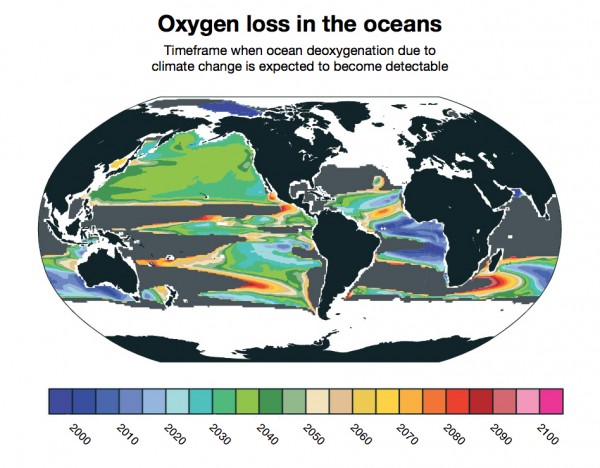By Ana Verayo, | May 04, 2016

Deoxgenation due to climate change is already detectable in some parts of the ocean.
Scientists have revealed another dangerous consequence of man made climate change where global warming is apparently sucking out the oxygen out of the world's oceans, endangering all marine ecosystems.
In this new study carried out by scientists from the National Center for Atmospheric Research, this alarming event is causing reducing oxygen supply levels that are dissolving in global oceans, spreading across larger regions all over the planet, by the year 2030 between 2040, which are apparently manifesting in some places already.
Like Us on Facebook
According to lead author of the study, NCAR scientist, Matthew Long, this loss of oxygen and the disappearance of this fleeting oxygen is definitely a threatening side effect from a continuously warming atmosphere, posing a major threat to marine life.
He adds that oxygen concentrations are not all the same in different regions due to wind variations and different surface temperatures, making it a challenge to link any deoxygenation event to climate change. However, in this new study, we are now expecting for human impact of climate change to overwhelm these natural variables.
To be able to acquire these results, the data for this study was collected and translated in computer models, revealing that this decrease in dissolving oxygen is already evident in the southern parts of the Indian Ocean and even the eastern tropical Pacific and Atlantic basins.
Oceans are able to collect oxygen supply from the surface, not only from the Earth's atmosphere but also from phytoplankton as well, as these organisms emit oxygen into the water.
According to a Yale study, as ocean temperatures become warmer, the surface of seawater apparently becomes lighter from the mixing of freshwater from glacial melt, that includes melting icebergs and ice sheets. Since freshwater is lighter in composition, it is less likely to sink in the ocean's deeper depths which prevents oceans, blocking the ocean's supply of oxygen.
This decreased in dissolved oxygen is also known as hypnoxia where it can produce sprawling dead zones in the ocean, which means that these regions are already devoid of any sort of marine life. This new study is published in the journal, Global Biogeochemical Cycles.
-
Use of Coronavirus Pandemic Drones Raises Privacy Concerns: Drones Spread Fear, Local Officials Say

-
Coronavirus Hampers The Delivery Of Lockheed Martin F-35 Stealth Fighters For 2020

-
Instagram Speeds Up Plans to Add Account Memorialization Feature Due to COVID-19 Deaths

-
NASA: Perseverance Plans to Bring 'Mars Rock' to Earth in 2031

-
600 Dead And 3,000 In The Hospital as Iranians Believed Drinking High-Concentrations of Alcohol Can Cure The Coronavirus

-
600 Dead And 3,000 In The Hospital as Iranians Believed Drinking High-Concentrations of Alcohol Can Cure The Coronavirus

-
COVID-19: Doctors, Nurses Use Virtual Reality to Learn New Skills in Treating Coronavirus Patients







